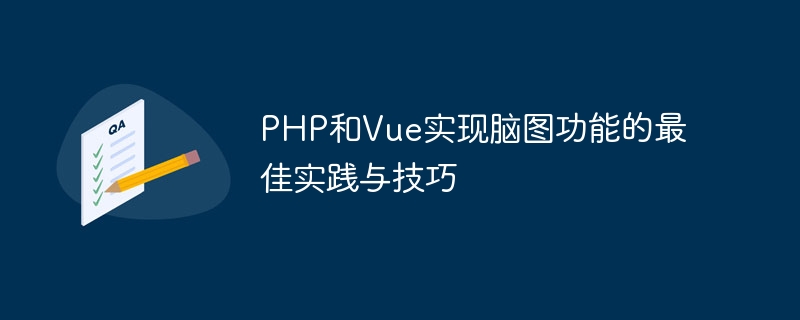

Best practices and techniques for PHP and Vue to implement the brain map function
Foreword:
Brain map is a method used to display mind maps and information organization A graphical tool that can help people better understand and organize complex thinking logic and information structures. Implementing mind mapping functions in web applications can help users organize and manage information more efficiently. This article will introduce how to use PHP and Vue to implement mind mapping functions, and share some best practices and techniques.
Front-end preparation
First, we need to introduce Vue and the corresponding mind map plug-in. Add the following code in the HTML:
<!DOCTYPE html> <html> <head> <meta charset="utf-8"> <title>脑图功能</title> <script src="https://cdn.jsdelivr.net/npm/vue"></script> <script src="https://cdn.jsdelivr.net/npm/vue-mindmap"></script> </head> <body> <div id="app"> <vue-mindmap :data="mindmapData"></vue-mindmap> </div> <script src="app.js"></script> </body> </html>
In the above code, we introduced Vue and the Vue mind map plug-in. Then, we created a div with the id "app" and added the vue-mindmap component inside it. Finally, we introduced the app.js file for writing Vue’s logic code.
Back-end preparation
In the back-end, we use PHP to handle the addition, deletion, modification, and persistence of data. We need to create an API for data interaction with the front end. The following is a simple PHP sample code:
<?php
header("Access-Control-Allow-Origin: *");
header("Content-Type: application/json; charset=UTF-8");
$method = $_SERVER['REQUEST_METHOD'];
$url = $_SERVER['REQUEST_URI'];
// 处理GET请求,获取脑图数据
if ($method === 'GET' && $url === '/api/mindmap') {
$data = file_get_contents('data.json');
echo $data;
}
// 处理POST请求,保存脑图数据
if ($method === 'POST' && $url === '/api/mindmap') {
$data = file_get_contents('php://input');
file_put_contents('data.json', $data);
echo '{"success": true}';
}
// 其他请求返回404错误
http_response_code(404);
echo json_encode(['error' => 'Not Found']);The above code simply handles GET and POST requests, which are used to obtain and save brain map data respectively. The GET request is used to obtain the data in data.json, while the POST request is used to save the data passed by the front end into data.json. Here we assume that data.json is a file that stores brain map data.
Vue logic code
In app.js, we will write Vue’s logic code and interact with the backend API. The following is a simple sample code:
new Vue({
el: '#app',
data: {
mindmapData: {}
},
mounted() {
this.fetchMindmapData();
},
methods: {
fetchMindmapData() {
axios.get('http://localhost/api/mindmap')
.then(response => {
this.mindmapData = response.data;
})
.catch(error => {
console.error(error);
});
},
saveMindmapData() {
axios.post('http://localhost/api/Mindmap', this.mindmapData)
.then(response => {
console.log('Data saved successfully');
})
.catch(error => {
console.error(error);
});
}
}
});The above code first creates a Vue instance and mounts it to the div with the id "app". Then, we defined the mindmapData attribute to store the mind map data. In the mounted hook function, we call the fetchMindmapData method to obtain the mind map data and assign it to mindmapData. In the fetchMindmapData method, we use the axios library to send a GET request to the backend API and assign the returned data to mindmapData. In the saveMindmapData method, we use the axios library to send a POST request to the backend API and save the mindmapData to the backend.
Complete example
Based on the above code, we can create a complete page that implements the brain map function. The following is the HTML code for a complete example:
<!DOCTYPE html> <html> <head> <meta charset="utf-8"> <title>脑图功能</title> <script src="https://cdn.jsdelivr.net/npm/vue"></script> <script src="https://cdn.jsdelivr.net/npm/vue-mindmap"></script> </head> <body> <div id="app"> <vue-mindmap :data="mindmapData"></vue-mindmap> <button @click="saveMindmapData">保存</button> </div> <script src="https://cdn.jsdelivr.net/npm/axios/dist/axios.min.js"></script> <script src="app.js"></script> </body> </html>
The following is the app.js code for a complete example:
new Vue({
el: '#app',
data: {
mindmapData: {}
},
mounted() {
this.fetchMindmapData();
},
methods: {
fetchMindmapData() {
axios.get('http://localhost/api/mindmap')
.then(response => {
this.mindmapData = response.data;
})
.catch(error => {
console.error(error);
});
},
saveMindmapData() {
axios.post('http://localhost/api/Mindmap', this.mindmapData)
.then(response => {
console.log('Data saved successfully');
})
.catch(error => {
console.error(error);
});
}
}
});In the above example code, we have added a save button that when the button is clicked Call the saveMindmapData method to save the mind map data. At the same time, we introduced the axios library for sending HTTP requests.
Conclusion:
This article introduces how to use PHP and Vue to implement the brain map function, and gives some best practices and techniques. By combining PHP and Vue, we can implement a powerful and easy-to-use brain map function to help users organize and manage information more efficiently. I hope this article can inspire you, thank you for reading!
The above is the detailed content of Best practices and techniques for implementing mind mapping functions with PHP and Vue. For more information, please follow other related articles on the PHP Chinese website!